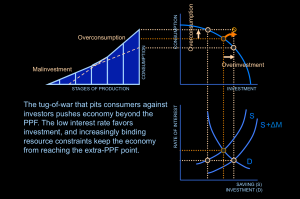 In October 2009, Toby and I attended the Ludwig von Mises Institute’s Supporters Summit in Salamanca, the birthplace of economic theory:
In October 2009, Toby and I attended the Ludwig von Mises Institute’s Supporters Summit in Salamanca, the birthplace of economic theory:
One of the great discoveries of the 20th century concerns the origins of economic science in the late middle ages in Spain and Italy. Long before Adam Smith wrote, many scholastics from the 14th through the 17th centuries were writing systematic economic theory.
No spot on the planet was as fruitful as the School of Salamanca in Spain. Here was the world center of economic research. The writings by the intellectuals gathered here explained price, value, money and its function, saving, entrepreneurship, inflation, contract and exchange, and so much more – and they closely engaged the modern world that was being born at that time, providing at theory and a rationale for the rise of prosperity.
For me, it was a particularly memorable and moving trip. I took the call informing me that I had been shortlisted for the Wycombe Parliamentary selection procedure, against all expectations, while sitting in the departure lounge at Girona after a week’s skydiving in Empuriabrava. I arrived at the Summit, knowing it was suddenly possible I would be an elected politician within the year.
Moreover, it’s no secret that I am a Christian, so it was reaffirming to discover that classical liberalism can be traced to men of God who developed their theory on the basis of morality, jurisprudence, theology and reason. An early speaker at the Summit was a contemporary Spanish friar whose passion for the poor and whose commitment to liberalism transcended the barriers of language. He knew as I know that the proper formula for widespread prosperity and the improvement of mankind is the doctrine of liberty: peace, equality before the law, freedom from arbitrary government, property and the family. In Cobdenite language, we might call for honest money, free markets, free trade, peace and the classical rule of law.
And so as I write on this Palm Sunday, we come to the Telegraph’s report “Catholic church: Big Society is failing“:
The Archbishop of Westminster, Vincent Nichols, criticised the Prime Minister’s flagship policy as lacking “teeth”. The archbishop has been one of the most prominent supporters of the Big Society, but he told The Sunday Telegraph that he feared communities hit by the economic downturn would suffer if they did not get support.
The head of the Catholic Church in England and Wales said Catholics were afraid the Coalition was “washing its hands” of its responsibilities to communities and expecting volunteers to fill the gap.
“It is all very well to deliver speeches about the need for greater voluntary activity, but there needs to be some practical solutions,” he said.
The Archbishop asks,
“Has the Conservative part of the Coalition simply seized the economic crisis as an opportunity to push through the unfinished neoliberal agenda of the last Conservative administration? We should not forget the enormous social division that was entailed in this. It signalled the end of a humanist and humane consensus in British society.”
How far the Archbishop has come from the scholastics of Salamanca. Yet the Archbishop is on to something:
“The poorest are taking the biggest hit while at the same time you see huge bank bonuses and profits and this is not right,” he said.
Now we have a point of agreement. We know we have the worst of all possible banking systems – the Governor of the Bank of England has told us so – and one of its effects is to distort the economy into unsustainable patterns thereby unjustly widening wealth inequality, driving the business cycle and precipitating banking crises, such as the one from which we are apparently recovering and at enormous cost to society. It is a statist banking system characterised by government monopoly, central planning, legal privilege and the socialisation of risk.
That very statism is the origin of the injustice the banking system is meting out to the rest of us.
The various doctrines of statism have failed. For those of us who wish to live in an ethical society which benefits all its members, it is time to rediscover that moral tradition of social thinking which began formally in Salamanca. It is time to refine and apply the doctrine of justice, peace, prosperity and fulfilment which is humble about the uses of coercive power and optimistic about the potential of individuals cooperating in society.
It may be true that those who wear the badges of ethical authority reach often for the coercive power of the state, but those of us with an intellectual, moral and practical basis for another way would do well to remember both the origins of our school of thought and the motto of one of our inspirations, Ludwig von Mises:
Do not give in to evil but proceed ever more boldly against it.


